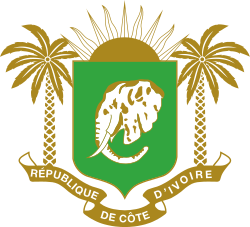Background
Following the agreement, the election was planned to be held in the first quarter of 2008. [4] On 6 August 2007, then-president Laurent Gbagbo said it would be possible, with goodwill and determination, to hold the election as early as December 2007. [5] [6] This was greeted with widespread skepticism by observers and the opposition, who said that the preparations for elections would be incomplete at such an early stage. [6] It was announced on 12 September that the process of voter identification and registration would begin on 25 September, [7] and if it went well it was expected to be completed by the end of 2007. [8] On 13 September the President of the Independent Electoral Commission (CEI), Robert Mambe, said that the presidential election should be held, "at the latest", ten months after the end of the identification process, around October 2008, [7] and that the parliamentary election should be held 45 days after the presidential election. [8] On 18 September Gbagbo again expressed his desire to see the elections held quickly and said that he was opposed to the "remote dates" being suggested. [9]
The public hearings of the identification process were intended for about three million people born in Ivory Coast who did not yet have identification papers. The hearings were launched on 25 September and were to be held first in Ouragahio and Ferkessédougou, respectively the home regions of Gbagbo and Prime Minister Guillaume Soro. [10] The French company Sagem was designated as the technical operator of the electoral register in November 2007. [11]
On 27 November Gbagbo and Soro reached an agreement in Ouagadougou, Burkina Faso, that the election would be held by the end of June 2008; the electoral commission was to propose the specific date of the election. [12] Gbagbo reiterated on December 19 that the election would be held no later than the end of June 2008, and he said that he would visit all the regions held by the New Forces by March 2008 and would then make a report to the Constitutional Council, which would in turn approve the holding of the election. [13]
French Minister of Foreign Affairs Bernard Kouchner said on 27 January 2008 that the election might be delayed slightly past the end of June deadline due to technical requirements, particularly the need to update voter lists. [14]
While Ouattara and Bédié said that full implementation of the peace agreement, including total disarmament of the New Forces, was not necessary prior to the holding of the election, Pascal Affi N'Guessan, the President of the Ivorian Popular Front (FPI), Gbagbo's party, said that disarmament must be completed before the election. [15]
By March 2008, the common view among observers was that it would be impossible to hold the election as early as June. Although no leading political figures had yet expressed that view, in March Gbagbo referred to the importance of considering actual conditions and said that it would not mean "death" if the election was not held in June. [11]
On 14 April Government Spokesman Amadou Koné announced that the presidential election would be held on 30 November, thus delaying it by five months. According to Koné, the date was chosen by the CEI, which had presented a report to the government. Koné said that the parliamentary election would be held on a different date. [16] Gbagbo expressed enthusiasm on the occasion, describing it as "a great day for Côte d'Ivoire". According to Soro's spokesman Sindou Méité, a "broad consensus" had been reached by Soro and other leading political figures regarding the date. The PDCI and RDR welcomed the announcement of a date, although they remained cautious; the United Nations Operation in Ivory Coast also welcomed it. On the same day, Gbagbo signed a decree outlining the terms of cooperation between the National Institute of Statistics and the French company Sagem, the latter of which is tasked with surveying the population so that voter lists can be updated and new voter cards can be created. [17]
This page is based on this
Wikipedia article Text is available under the
CC BY-SA 4.0 license; additional terms may apply.
Images, videos and audio are available under their respective licenses.

